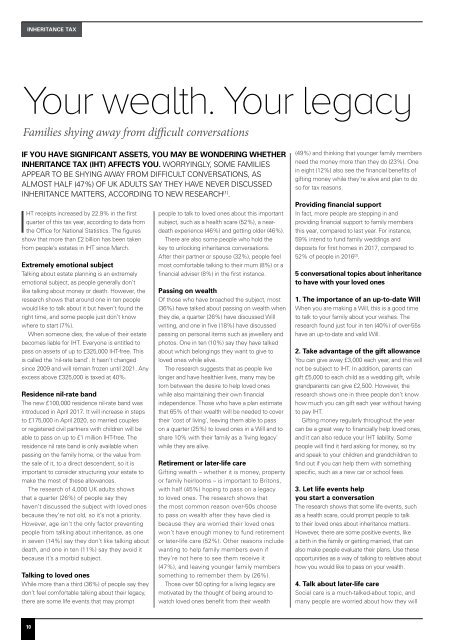Beaumont-Briefing-November-December-17
You also want an ePaper? Increase the reach of your titles
YUMPU automatically turns print PDFs into web optimized ePapers that Google loves.
INHERITANCE TAX<br />
Your wealth. Your legacy<br />
Families shying away from difficult conversations<br />
IF YOU HAVE SIGNIFICANT ASSETS, YOU MAY BE WONDERING WHETHER<br />
INHERITANCE TAX (IHT) AFFECTS YOU. WORRYINGLY, SOME FAMILIES<br />
APPEAR TO BE SHYING AWAY FROM DIFFICULT CONVERSATIONS, AS<br />
ALMOST HALF (47%) OF UK ADULTS SAY THEY HAVE NEVER DISCUSSED<br />
INHERITANCE MATTERS, ACCORDING TO NEW RESEARCH [1] .<br />
IHT receipts increased by 22.9% in the first<br />
quarter of this tax year, according to data from<br />
the Office for National Statistics. The figures<br />
show that more than £2 billion has been taken<br />
from people’s estates in IHT since March.<br />
Extremely emotional subject<br />
Talking about estate planning is an extremely<br />
emotional subject, as people generally don’t<br />
like talking about money or death. However, the<br />
research shows that around one in ten people<br />
would like to talk about it but haven’t found the<br />
right time, and some people just don’t know<br />
where to start (7%).<br />
When someone dies, the value of their estate<br />
becomes liable for IHT. Everyone is entitled to<br />
pass on assets of up to £325,000 IHT-free. This<br />
is called the ‘nil-rate band’. It hasn’t changed<br />
since 2009 and will remain frozen until 2021. Any<br />
excess above £325,000 is taxed at 40%.<br />
Residence nil-rate band<br />
The new £100,000 residence nil-rate band was<br />
introduced in April 20<strong>17</strong>. It will increase in steps<br />
to £<strong>17</strong>5,000 in April 2020, so married couples<br />
or registered civil partners with children will be<br />
able to pass on up to £1 million IHT-free. The<br />
residence nil rate band is only available when<br />
passing on the family home, or the value from<br />
the sale of it, to a direct descendent, so it is<br />
important to consider structuring your estate to<br />
make the most of these allowances.<br />
The research of 4,000 UK adults shows<br />
that a quarter (26%) of people say they<br />
haven’t discussed the subject with loved ones<br />
because they’re not old, so it’s not a priority.<br />
However, age isn’t the only factor preventing<br />
people from talking about inheritance, as one<br />
in seven (14%) say they don’t like talking about<br />
death, and one in ten (11%) say they avoid it<br />
because it’s a morbid subject.<br />
Talking to loved ones<br />
While more than a third (36%) of people say they<br />
don’t feel comfortable talking about their legacy,<br />
there are some life events that may prompt<br />
people to talk to loved ones about this important<br />
subject, such as a health scare (52%), a neardeath<br />
experience (46%) and getting older (46%).<br />
There are also some people who hold the<br />
key to unlocking inheritance conversations.<br />
After their partner or spouse (32%), people feel<br />
most comfortable talking to their mum (8%) or a<br />
financial adviser (8%) in the first instance.<br />
Passing on wealth<br />
Of those who have broached the subject, most<br />
(36%) have talked about passing on wealth when<br />
they die, a quarter (26%) have discussed Will<br />
writing, and one in five (18%) have discussed<br />
passing on personal items such as jewellery and<br />
photos. One in ten (10%) say they have talked<br />
about which belongings they want to give to<br />
loved ones while alive.<br />
The research suggests that as people live<br />
longer and have healthier lives, many may be<br />
torn between the desire to help loved ones<br />
while also maintaining their own financial<br />
independence. Those who have a plan estimate<br />
that 65% of their wealth will be needed to cover<br />
their ‘cost of living’, leaving them able to pass<br />
on a quarter (25%) to loved ones in a Will and to<br />
share 10% with their family as a ‘living legacy’<br />
while they are alive.<br />
Retirement or later-life care<br />
Gifting wealth – whether it is money, property<br />
or family heirlooms – is important to Britons,<br />
with half (45%) hoping to pass on a legacy<br />
to loved ones. The research shows that<br />
the most common reason over-50s choose<br />
to pass on wealth after they have died is<br />
because they are worried their loved ones<br />
won’t have enough money to fund retirement<br />
or later-life care (52%). Other reasons include<br />
wanting to help family members even if<br />
they’re not here to see them receive it<br />
(47%), and leaving younger family members<br />
something to remember them by (26%).<br />
Those over 50 opting for a living legacy are<br />
motivated by the thought of being around to<br />
watch loved ones benefit from their wealth<br />
(49%) and thinking that younger family members<br />
need the money more than they do (23%). One<br />
in eight (12%) also see the financial benefits of<br />
gifting money while they’re alive and plan to do<br />
so for tax reasons.<br />
Providing financial support<br />
In fact, more people are stepping in and<br />
providing financial support to family members<br />
this year, compared to last year. For instance,<br />
59% intend to fund family weddings and<br />
deposits for first homes in 20<strong>17</strong>, compared to<br />
52% of people in 2016 [2] .<br />
5 conversational topics about inheritance<br />
to have with your loved ones<br />
1. The importance of an up-to-date Will<br />
When you are making a Will, this is a good time<br />
to talk to your family about your wishes. The<br />
research found just four in ten (40%) of over-55s<br />
have an up-to-date and valid Will.<br />
2. Take advantage of the gift allowance<br />
You can give away £3,000 each year, and this will<br />
not be subject to IHT. In addition, parents can<br />
gift £5,000 to each child as a wedding gift, while<br />
grandparents can give £2,500. However, the<br />
research shows one in three people don’t know<br />
how much you can gift each year without having<br />
to pay IHT.<br />
Gifting money regularly throughout the year<br />
can be a great way to financially help loved ones,<br />
and it can also reduce your IHT liability. Some<br />
people will find it hard asking for money, so try<br />
and speak to your children and grandchildren to<br />
find out if you can help them with something<br />
specific, such as a new car or school fees.<br />
3. Let life events help<br />
you start a conversation<br />
The research shows that some life events, such<br />
as a health scare, could prompt people to talk<br />
to their loved ones about inheritance matters.<br />
However, there are some positive events, like<br />
a birth in the family or getting married, that can<br />
also make people evaluate their plans. Use these<br />
opportunities as a way of talking to relatives about<br />
how you would like to pass on your wealth.<br />
4. Talk about later-life care<br />
Social care is a much-talked-about topic, and<br />
many people are worried about how they will<br />
10
















